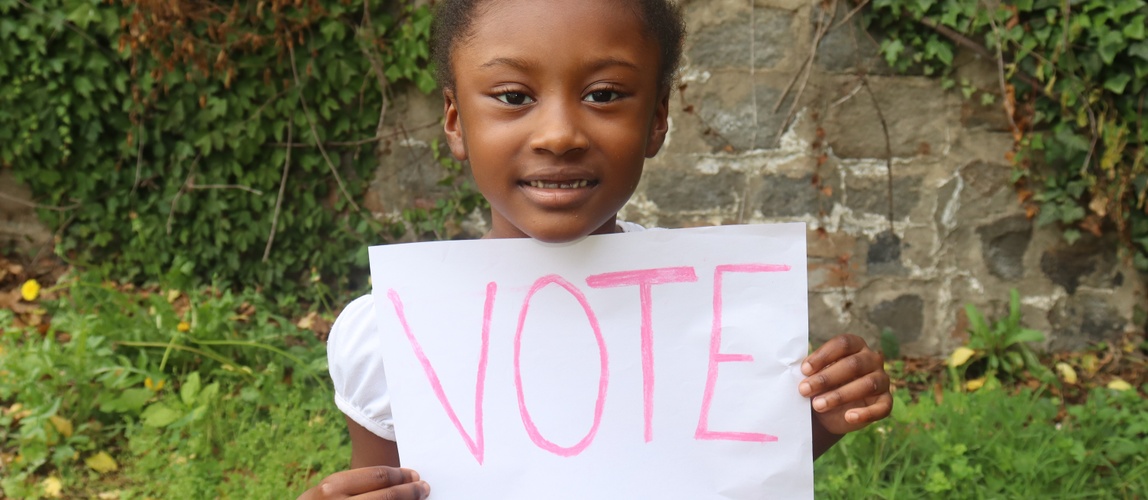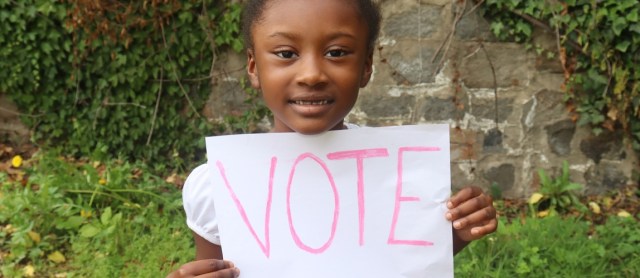
You may have noticed, there’s an election coming up…and it’s overall calming effects are exactly what we all needed on top of our pandemic. All irony aside, it feels like our feeds, our conversations and even our quiet moments have been consumed by the upcoming vote—and, no matter your beliefs, the strain of uncertainty and the general nature of the discourse provide a consistent dose of stress. In fact, there’s even a therapist-coined term for an extreme version of the experience—election stress disorder.
As with the pandemic, it’s essentially impossible to insulate our kids from the impact of this election. This means we don’t have to, and probably shouldn’t, shy away from discussing it with them. In fact, we know that talking with kids about elections can increase their engagement in the political process later on. Deborah Rivas-Drake, a Professor of Psychology & Education at the University of Michigan who studies civic engagement explains this phenomenon quite well: “You’re planting seeds that will bear fruit later in terms of their understanding of themselves as civic and political actors who have agency.”
So, with just a few more days to go, how can we frame the election for kids in a way that helps them engage but also keeps them feeling safe and calm during it? No matter your political beliefs, here are 5 ways to approach the election that are supportive of young kids, and that will likely feel supportive of you, too.
Focus on Democracy
At the end of the day, it’s an enormous privilege and an essential right that we get to vote for our elected officials—and this gives us a simple, powerful and positive focus when engaging kids around the election conversation. Encourage others you love to vote and share your excitement to vote with your kids. To help signal to kids just how special voting is, you can also make voting day feel like a celebration. In Australia, for example, voting day is a holiday featuring special treats like “democracy sausage.” In our family, we plan to eat “pepperoni polling pizza” on election night. Whatever fun you choose to add, a little celebration can help reinforce the importance of our democracy in terms kids can understand.
Give Yourself Space to Process the News
Election coverage and commentary are reaching fever pitch. Turn on your phone, check your feed, drive or walk around your neighborhood, and signs of the election are literally everywhere. Social media algorithms are working in overdrive to keep serving us the election drama that keeps us engaged. So, it’s important to remember that kids watch us as we process these messages, and they see our reactions.
Often we get drawn in (mom’s distracted…queue the misbehavior!) or we tense up, look puzzled or worried. Kids sense this—we are their source of comfort, and they are wired to notice and respond to changes. To help kids, and to help yourself, try picking a few, distinct times each day to “plug in” and take in election updates. If you can, find a quiet time and space to do it, out of the watchful eye of young children. This will give you the chance to have your immediate response and process the information without raising any alarm bells for your kiddos.
Prepare Kids by Explaining It Doesn’t Always Go Your Way
No matter your politics, you’ve likely experienced disappointment at the presidential polls in your voting lifetime. Even if you haven’t, you can probably imagine how much it hurts. And though these feelings can feel overpowering, as adults with fully-formed brains, in time, we’re generally able to rationalize and talk ourselves through ways it’s going to be okay. For our kids, this isn’t the case.
Young kids are still learning about disappointment, and they generally believe deeply that we, their treasured grownups, know how to keep them safe and make their world okay. So, it can feel really unsettling to them when we get disappointed. That’s why it’s important, no matter how confident you are about your chosen candidate, to start to introduce the idea to kids that your candidate may lose. At the same time, try to help kids understand that even if your candidate is not successful, our democracy, and our world, will go on.
Beware of “Them vs Us” Rhetoric & Stay Curious
In our current context, it’s easy to fall into the trap of using “Them vs. Us” rhetoric. No matter how vigilant we are about our own language, we can all find ourselves being triggered to speak in sweeping terms about whole groups of people who do not share the same perspective—especially about issues we really care about. Even if you don’t speak this way, kids can pick up on this language from other people in your family or community, or from the media.
Listen for moments in which people speak poorly about a whole party or group of people based on a belief they have. You can flip this script by explaining to kids that, even though you don’t agree with this group’s beliefs, you also don’t support the negative way they’re being talked about. You can also explain that you know most people are good people, but you just don’t agree with this particular group on this particular issue.
Perhaps one of the most important things that we can do right now, as parents, is to help our kids foster a practice of listening to one another, asking questions, and taking the time to understand other peoples’ differing opinions.
Double down on Hope & Community
In the middle of it all, try to maintain rituals that help kids feel connected to the people in your community and hopeful about the future. Meeting outdoors is not only a safe way to connect with others, but it also puts everyone in a space that we all share, no matter our political views—our natural world.











